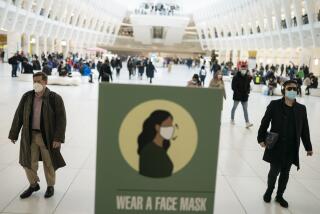U.S. Seeks to Limit Handicap Law : People With Contagious Diseases May Be Fired, Court Told
- Share via
WASHINGTON — The Reagan Administration, arguing in a highly controversial case that could affect AIDS patients in their jobs, Wednesday told the Supreme Court that people with contagious diseases should not be protected by federal anti-discrimination laws covering the handicapped.
U.S. Solicitor General Charles Fried, advancing an apparent Catch-22 argument, said a person with a contagious disease is not legally “handicapped” unless he is actually “impaired.” But, if a person does become “impaired” in his illness, he may be legally dismissed because he could be judged unable to perform his job.
For the record:
12:00 a.m. Dec. 11, 1986 For the Record
Los Angeles Times Thursday December 11, 1986 Home Edition Part 1 Page 2 Column 1 National Desk 2 inches; 66 words Type of Material: Correction
To clarify the Administration’s position in a recent Supreme Court case, U.S. Solicitor General Charles Fried said persons who carry serious contagious diseases--such as polio, tuberculosis or AIDS--but who are still able to work can be protected under a 1973 anti-discrimination law covering “otherwise qualified handicapped individuals.” However, if they become too ill to work, or become a health threat to others, they could lose this status and be dismissed.
In this first case to test if a “contagious disease” constitutes a handicap--and, therefore, is protected by federal law--the justices must decide whether a Florida school board may dismiss a teacher with recurring tuberculosis.
Closely Watched Case
Although the case concerns tuberculosis, a disease that is highly contagious but easily treatable, it has been closely watched as a court test for AIDS, which is not highly contagious but which so far has no cure.
In 1979, the Nassau County, Fla., school board fired teacher Gene H. Arline, contending that her pupils were in danger of contracting TB. She sued but lost. However, in 1985, the U.S. 11th Circuit Court of Appeals ruled that her contagious disease is a handicap and sent the case back for another trial to determine whether the board could arrange some “accommodation” for Arline. The board then appealed to the Supreme Court.
Fried told the justices that Congress “did not envision” that the civil rights law covering the handicapped “would deal with all manner of social problems. The law must be kept within some manageable bounds.”
(The law says that “no otherwise qualified handicapped individual . . . shall, solely because of his handicap, be . . . subjected to discrimination under any program or activity receiving federal financial assistance.”)
Pointed Questions
After several pointed questions from the bench, Fried acknowledged that the teacher was “plainly handicapped” when the TB recurred in her lungs. But, because of this condition, she was not “otherwise qualified” to teach young children. “She is not excluded solely by reason of her handicap,” he argued.
A lawyer representing the teacher said the high court should endorse the appeals court ruling and return the case for further trial.
“We will not contend that she is otherwise qualified” to teach young children, said George Rahdert, from St. Petersburg, Fla. “We will merely ask that she be considered for other positions.”
During the hourlong argument, the justices appeared deeply troubled by the difficult issues raised by the case, including the key question of whether a contagious disease in itself was a handicap.
No Questions on AIDS
Justice Sandra Day O’Connor asked whether someone who was “hideously disfigured” by burns--but otherwise unimpaired--could be considered handicapped. Justice John Paul Stevens asked about a friend who had only one arm but “can do all the things an average person can do.” Justice Antonin Scalia asked if someone who is “sufficiently ugly” to repel employers might be deemed handicapped. No one asked about AIDS.
Fried’s argument, although offering little solace to those suffering from diseases, may gain the support of the court. In a key 1979 case involving a deaf girl seeking to become a nurse, the justices ruled that, while clearly handicapped, she was not “otherwise qualified” because she would not be able to hear doctors or patients.
A decision in the case (School Board of Nassau County vs. Arline, 85-1277) can be expected by July.
More to Read
Sign up for Essential California
The most important California stories and recommendations in your inbox every morning.
You may occasionally receive promotional content from the Los Angeles Times.














